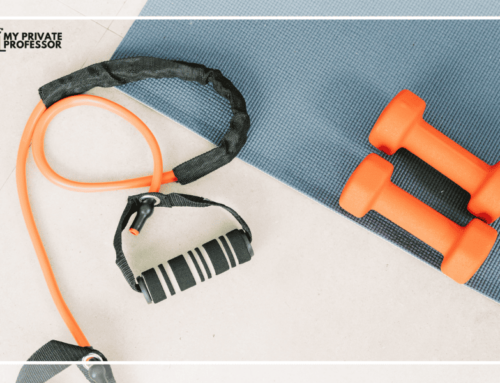Yoga: some people swear by it, while others are convinced that it’s one of those fitness fads that, despite promises of life-changing benefits, doesn’t actually do anything.
Based on first-hand experience, I can confidently say that yoga does, in fact, offer benefits. And these may be valuable to any individual—but especially, college students. 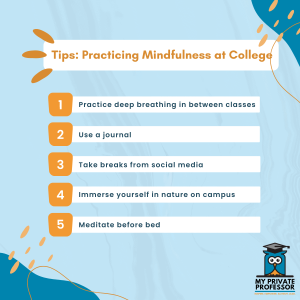
College students—they’re kind of like superheroes.
As a college student, you’re taking on the world: meeting new people, adjusting to a new schedule, living with a new person, acclimating to new meals, getting used to a new social environment, and taking on a ton of work. Yeah, it’s a lot.
It seems that, in order to take on that much, and successfully, you need a clear mind. Or at least, the ability to transition from a chaotic to clear mind. And that doesn’t come easily to everyone—rather, many people have to work for this. But thankfully, you don’t have to take this on alone. Enter: yoga.
Think of yoga as the Robin to your Batman in your quest to take on the world (while staying sane).
Yoga reduces stress
On any given day as a college student, something (or, maybe more accurately, several things) may be giving you stress. By promoting mindfulness, yoga can help you reduce stress.
How?
Yoga helps your body release mood-boosting endorphins, which improves your ability to manage stress. 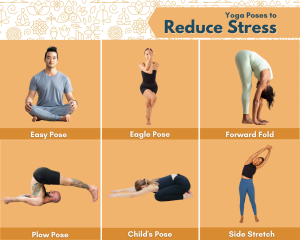
In a study published in Anxiety, Stress, & Coping, researchers analyzed the effects of yoga on stress and psychological health among individuals who reported moderate-to-high stress. The researchers found that, after 16 weeks of yoga, those in the yoga practicing group showed significant reductions in stress compared to those in the control group.
A 2020 study found that doing yoga stretches can actually reduce cortisol levels (cortisol is the “stress hormone”), and has a positive effect on parasympathetic nerve activity (the network of nerves that relaxes your body after stressful or dangerous events).
When you’re stressed (for example, when waiting to see how you did on your Biology midterm), your body reflects it. That is, your muscles constrict. You often hold tension in places such as your shoulders, necks, and jaws. Yoga can help reduce these effects of stress by promoting relaxation and consequently reducing physical tension.
On top of this, yoga promotes relaxation by actually altering your brain waves.
Scandinavian researchers measured brain waves before and after a yoga class, determining that alpha waves (which produce feelings of calmness, increase concentration, and reduce stress) and theta waves (which enhance alertness, attention, and memory) significantly increased. This is important, because it suggests that:
- After yoga, your brain is significantly relaxed.
- Yoga enables you to have better awareness of your subconscious and emotions (and cultivating this awareness in turn helps you reduce stress).
So when people tell you that yoga can help you manage your stress, it’s not just based on optimism or some placebo effect. Evidently, it changes your brain which in turn, helps with stress management.
Yoga enhances focus
If you’re going from class to class, to the library to do homework, and then back to class, you’re obviously exerting a lot of brain power. And after a while, it inevitably becomes difficult to maintain concentration, because you’ve exhausted your energies.
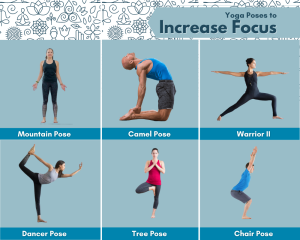 By helping increase blood circulation to the brain (which is crucial for the body to function properly), yoga promotes better concentration.
By helping increase blood circulation to the brain (which is crucial for the body to function properly), yoga promotes better concentration.
When you stretch during poses, you’re oxygenating your blood and thus feeding more nutrients to the vessels. And during breathing exercises, you pull your diaphragm down, which increases pressure in your abdomen. This effectively leads to your abdominal veins compressing. And the result is better circulation.
On the contrary, when you have poor blood circulation (AKA, insufficient blood flow to the brain) you may experience a lack of energy, memory issues, and difficulty concentrating.
And that’s not going to fly when you have five midterms packed into two days.
In a 2012 study, after doing just 20 minutes of yoga, participants performed better (in both speed and accuracy) on brain functioning tests compared to after doing aerobic exercises.
Yoga boosts memory
As a student, it may feel as though you have endless amounts of information to memorize. From trigonomic functions and complex chemical processes to mastering Spanish conjugations, it can be a lot. Whatever your focus of study is, there’s no way around the fact that you’ll have to do some memorizing during your time as a student.
Harvard Health Publishing made a pretty spot-on analogy when it comes to yoga’s effects on the brain. Consider what you’re doing when you lift weights—strengthening your muscles. So yoga, which is essentially a strengthening exercise for the brain, is like “weightlifting for the brain”.
Studies using MRI scans and other brain imaging technology have found that people who regularly did yoga had a thicker cerebral cortex and hippocampus than those who didn’t practice yoga.
So…?
Well, the cerebral cortex and hippocampus are two brain structures that are majorly involved in learning and memory. And so, these two areas are a key component to student success.
With age, these areas typically shrink. But, as shown in these studies, older yoga-practitioners exhibited less shrinkage than non-practitioners. This demonstrates that yoga may, to some extent, counteract age-related declines in memory and cognition.
Yoga improves sleep quality
By now you’ve probably figured out that sleep quality can make or break your entire day. And also, that the effects of poor sleep can seep into, well, pretty much every aspect of your life. And in college, it can be difficult to get that beauty sleep that you need. 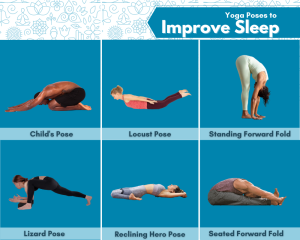
The slow and controlled breathing that yoga involves stimulates a specific nerve: the vagus nerve. This nerve is a major component of the parasympathetic nervous system (PNS), the system that helps calm your organs in moments of stress or danger.
Yoga helps regulate the PNS and stimulates the vagus nerve by reducing heart rate and regulating breathing patterns. As a result, yoga helps elevate your ability to manage stress. And of course, reducing stress is a major key for improving sleep quality.
In addition, it’s notable that yoga can boost melatonin production (melatonin is the hormone that promotes better sleep) through its focus on mindfulness. Plus, mindfulness in itself can help control your heart rate and breathing changes—both of which are linked to anxiety. And evidently, reducing anxiety makes it easier to get better sleep.
Research has, in fact, demonstrated that yoga can be a great tool for improving sleep.
For instance, elderly populations often report sleep issues more than their younger counterparts, according to the Sleep Foundation. And research has shown that elderly individuals who regularly practice yoga have improved sleep quality.
Additionally, according to the Sleep Foundation, women tend to have difficulty sleeping (compared to men). And studies have shown that yoga can benefit this population.
So evidently, yoga can improve sleep quality—and as we know, this is a huge component to general mental wellness. And managing that part of your daily life is a key step to reaching your academic potential.
Yoga decreases anxiety
Even if you’ve never been a particularly anxious person, some students find that come college, they begin experiencing bouts of anxiety. And this may be for a number of reasons. For instance, with all your courses you have to manage, you may be having test anxiety. 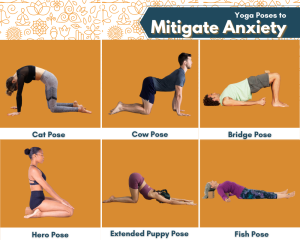
Or, you might just be having a strong reaction to all the changes in your new environment. You’ve got a lot of new faces you’re seeing everyday, a new living space, and new routines. Having some anxiety, as a response, seems pretty reasonable, right?
Yoga can help you manage and reduce your anxiety, and the great thing is that you can pretty much practice it anytime, anywhere.
An NYU Study found that after three months, yoga was significantly more effective for managing anxiety than stress management education.
Significantly, your breath is connected to your nervous system; when anxious, you probably take rapid, shallow breaths (or even by accidentally, hold your breath). Contrastingly, when you slow/deepen your breathing, you in turn calm your nervous system and reduce anxiety.
In addition, yoga increases vagal tone. What’s that, now?
Vagal tone is the measure of how well your vagus nerve is functioning; the vagus nerve, in addition to playing a key role in your PNS, maintains several regulatory functions including digestion, heart rate, and respiratory rate. By increasing your vagal tone, your body can physiologically relax more quickly after experiencing stress. This in itself can reduce anxiety.
A form of meditative therapy, yoga can be helpful for developing self-regulation and mindfulness, which in turn helps you stay attuned to how your body feels in the present moment. And this practice—simply building awareness and gaining the ability to stay in the present moment—can decrease anxiety and promote relaxation.
In fact, a 2012 research review suggests that meditative therapies are indeed effective tools for reducing anxiety.
Yoga improves mood and increases energy
Like all forms of exercise, yoga can boost your mood by lowering stress hormone levels, increasing feel-good chemicals (endorphins), and bringing more oxygenated blood to the brain.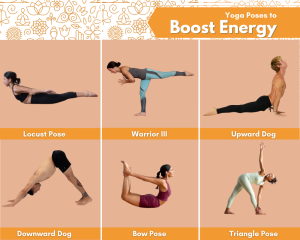
But yoga may have an edge on some other forms of exercise.
Yoga raises levels of something called gamma-aminobutyric acid (GABA), which is a neurotransmitter associated with better mood and decreased anxiety and depression. Consequently, this promotes a better mood.
When you consider the effect of that GABA hormone along with the good old endorphins, yoga seems like a pretty good deal.
On top of elevating your mood, yoga can also improve your physical energy. By focusing on chest-opening and -lifting poses while stimulating the vagus nerve, yoga can increase your physical energy and “subjective sense of energy”.
Final thoughts
Based on its wide range of benefits, yoga seems like a cure-all.
Yoga can help you re-organize your thoughts, build up strength and resilience, and somehow manage to keep it together even in the most chaotic of chaos. And for students, this may be the perfect medicine.
If you’re constantly trying to do everything perfectly and achieve all your goals without taking a pause to glance inward, you may find that life gets on top of you—so do yourself a favor and open yourself up to the powerful benefits of yoga.
Take it from (queen) Billie Jean King: “Self-awareness is probably the most important thing towards being a champion.”




